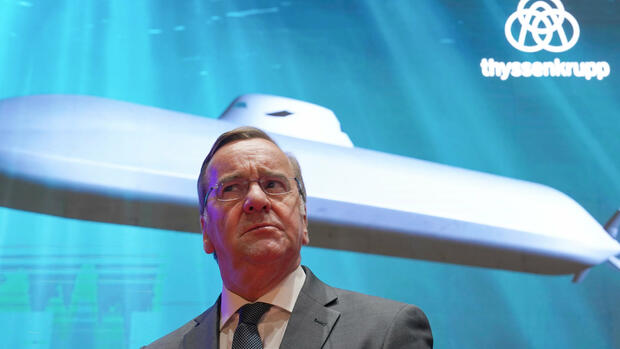Kiel The federal government is preparing to invest in the shipyard group Thyssen-Krupp Marine Systems (TKMS). “We are thinking about it,” Defense Minister Boris Pistorius (SPD) told journalists on Tuesday – confirming a corresponding report by Handelsblatt. He could hardly have found a more suitable place for his announcement. Together with his Norwegian counterpart Björn Arild Gram and the Thyssen Krupp board members Miguel López and Oliver Burkhard, he gave the starting signal for the production of a new class of submarines at the Kiel shipyard.
In the past few weeks, representatives of the federal government and Thyssen-Krupp had already explored the possibilities for state participation. In principle, according to sources familiar with the talks, the coalition partners viewed the project positively. Final approval is still pending.
According to Defense Minister Pistorius, a decision will not be made before the end of the year. “We are not the only ones involved,” said the Defense Minister. Other departments would also be involved. Therefore the decision will take some time. The Ministry of Defense will commission an audit by the state-owned KfW banking group; The Ministry of Finance and the Ministry of Economic Affairs should also assess the deal. In the end, Chancellor Olaf Scholz would also have to give his final approval.
Without federal involvement, jobs would probably be at risk. Thyssen-Krupp does not consider TKMS to be part of its core business and has therefore put the division up for sale several times. The shipyard subsidiary currently employs 6,000 people.
According to industry circles, the federal government has unofficially prohibited a sale to a foreign competitor. In the past few months, the management around TKMS boss Oliver Burkhard had already spoken to a number of financial investors.
Billion dollar risks on the books
But those interested are afraid of the risk that lies dormant in the company’s books. In order to win important orders, TKMS has provided its customers with numerous guarantees for the completion of the ships and submarines. According to company circles, they add up to over ten billion euros.
“No financial investor can take on such a burden,” it was said in financial and corporate circles. This is where the federal government comes into play. Because Germany is not only the most important customer, but could also step in as a guarantor for TKMS. A large part of the guarantees apply to orders from Germany, Norway and Israel anyway. These customers should be reassured if the federal government gives the green light to invest in the shipyard group.
>> Also read: The restructuring of Thyssen-Krupp is painful, but there is no alternative
The radar manufacturer Hensoldt is seen as a model for the federal government to get involved. The state contributed 25.1 percent. A share of 20 percent is also conceivable for TKMS, according to people familiar with the discussions.
For TKMS boss Burkhard, the timing of the negotiations is good. Because of the war in Ukraine, the order situation in the defense industry has improved. “We now have momentum due to the changing times,” said Burkhard on the sidelines of the event in Kiel. Through growth and possible follow-up orders, TKMS has become more interesting – also for financial investors.
Private investors could sell their stake again after an IPO that TKMS wants to carry out. The state would then hold on to its shares in order to ensure the group’s long-term independence. After the IPO, TKMS could also drive consolidation in the marine industry. Competitor Lürssen had already shown interest in a merger.
Unpopular participation
The core of today’s group, the former Howaldtswerke-Deutsche Werft, was taken over by Thyssen-Krupp in 2005. The federal government at the time had asked the group to acquire the company in discreet discussions. Politicians had concerns because HDW was under the control of the US financial investor One Equity Partners at the time and feared for the know-how in submarine construction.
At that time, the Ruhr group had a number of shipyards in Emden, Hamburg and other coastal towns. However, Thyssen-Krupp was unable to combine the individual parts into a network. The business therefore remained a foreign entity in the conglomerate, which also had little interest in armaments.
Over the years, Thyssen-Krupp representatives had negotiated a sale or merger with interested parties. However, a deal was never concluded with the French Naval, Fincantieri from Italy, the Arab group Abu Dhabi Mar and various financial investors. The exit from the business should now be achieved through the state.
More: “Everything has to go” has an end: How the new Thyssen Krupp boss wants to make the group attractive
